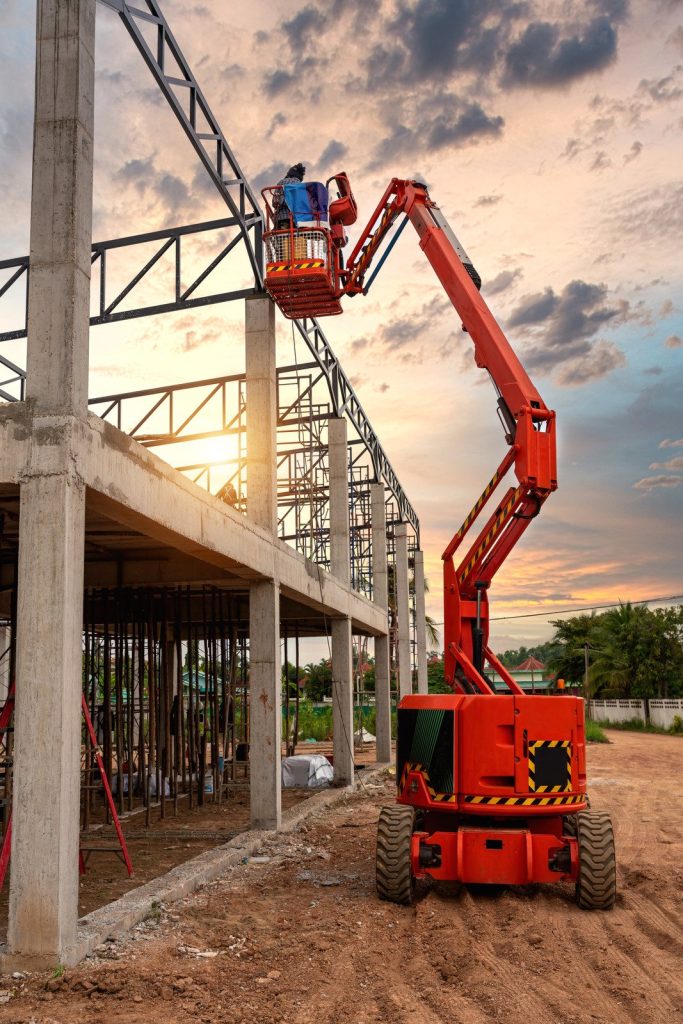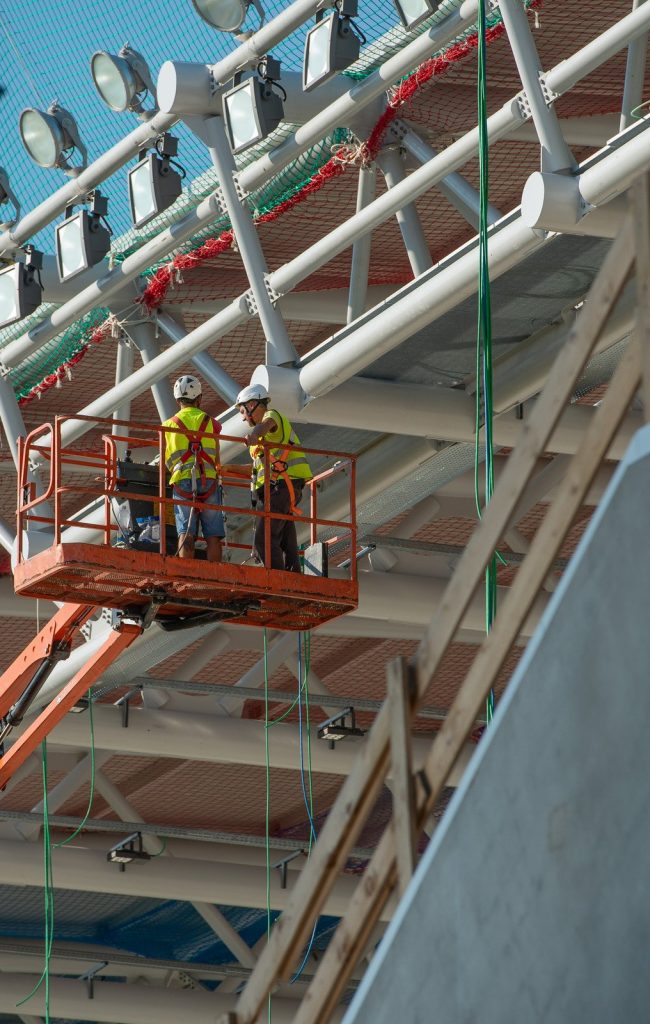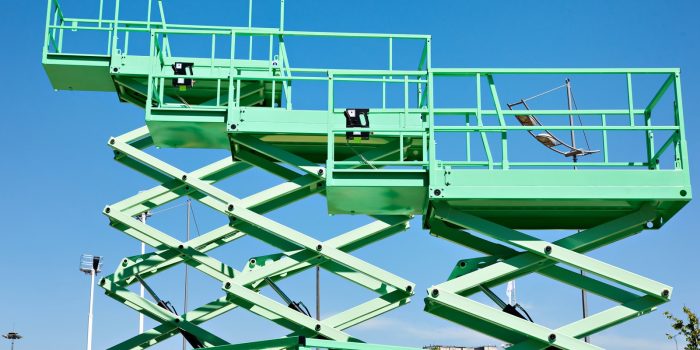Training as maintenance technician and operator of mobile platforms
The KURSO Training Centre offers a professional course for the qualification of maintainer and operator of mobile platforms, including aerial work platforms and scissor lifts. We provide theoretical and practical classes taught by qualified training staff. Our course is designed for people who wish to work as operators and maintainers of various types of mobile platforms. We invite you to familiarise yourself with the conditions of participation and the training programme.
Training programme for mobile platforms - aerial work platforms and scissor lifts
In our training course, students will gain a thorough knowledge of the construction and individual parts of mobile platforms. They will learn how these machines work and how to operate them while maintaining safe working conditions for themselves and others. The specialists who give the lectures use instructional videos, multimedia presentations and other teaching aids to make learning easier and faster. During the theoretical part, topics such as:
- general information on technical supervision,
- information on mobile platforms,
- construction and operation of mobile platforms (including aerial work platforms and scissor lifts),
- the various systems and mechanisms of mobile platforms,
- drive in platforms,
- chassis and platform,
- safeguards in the platforms,
- safe operation of mobile platforms,
- responsibilities in the work of a mobile platform operator and maintainer,
- carrying out maintenance checks on equipment before and after work,
- principles of occupational health and safety and fire safety. (including learning first aid).
Training for mobile platforms also includes practical, instructor-led activities. Participants have the opportunity to carry out specific activities that are part of the operator's and maintainer's duties and to steer the equipment themselves. The whole course takes place in a friendly atmosphere, which allows for effective learning.
Final examination and certification

The course to become a mobile platform maintainer and operator (including aerial work platforms and scissor lifts) concludes with a compulsory state examination supervised by a committee appointed by the Office of Technical Inspection. The course participants take a test part and then a practical part, which consists of performing a task at a specific mobile platform. If the participant obtains the required number of points, he or she is awarded a certificate that will enable them to work as a mobile platform operator or maintainer. These entitlements are issued by the Office of Technical Inspection and are valid for between 5 and 10 years, depending on the type of mobile platform. The period of validity of the authorisations for the different platforms:
- stationary - 10 years,
- mast - 10 years,
- Hanging - 10 years,
- on railway vehicles - 10 years,
- mobile (including aerial work platforms and scissor lifts) - 5 years.
Requirements for candidates:
- 18 years old,
- minimum primary education,
- be in good health to work as an operator or maintenance person for mobile platforms (aerial work platforms and scissor lifts).
Each person attending the course will be provided with:
- theoretical and practical classes,
- a database of sample exam questions,
- training materials,
- assistance with formalities,
- a pleasant atmosphere during classes.
Types of mobile platforms - key information
Stationary mobile platforms
They have a personnel bin fenced with barriers, which accommodates max. 2 workers. They are designed to work in one place, so they do not have the drive necessary to move. They are used for work inside warehouses, production halls, etc., as well as outdoors. The advantage of stationary mobile platforms is undoubtedly their small size, which allows for easy transport and use.
Mast climbing platforms
These devices are made up of a base, a mast on which the personnel platform moves and a chassis that allows this platform to move. They are used in various types of installation, renovation and construction sites. They are also used to carry out work in urban areas and in the restoration and conservation of historic buildings.

Suspended mobile platforms
This type of platform is mounted to buildings using special cables. These devices consist of a platform, winch, support structure and safety cables. Suspended mobile platforms are extremely useful for maintenance work and various activities on high floors of individual buildings.
Mobile platforms on railway vehicles
Because this type of platform is located on railway vehicles, it can easily and quickly reach a specific location. On the other hand, a special platform allows the operator to carry out his work. They are used for maintenance, various types of repairs and inspections related to tram and rail infrastructure.
Mobile lifting platforms
They belong to the most popular group of platforms. There is a distinction between free-running mobile platforms that move on wheels or tracks. They are usually powered by diesel or electricity. These include aerial work platforms and scissor lifts. There are also mobile platforms located on a trailer and towed behind a vehicle. The last group includes mobile platforms mounted on a truck chassis.
The most common types of platform

Aerial work platforms (high lifts)
Basket lifts have a long arm ending in a personnel basket, which is secured by railings. They are used to lift people to great heights. They are often used for construction, cleaning, finishing and maintenance work. They can also be used for mounting Christmas decorations, cleaning windows or pruning branches.
Scissor lifts
Scissor lifts, like scissors, fold and unfold in a similar way. They allow people and loads to be moved at height and are widely used in many industries. They are used in warehouses, logistics centres, production halls and supermarkets. They are used for painting buildings, installing air conditioning and heating systems, and lifting vehicles.
In addition, we offer:
- courses for the maintenance of mobile platforms (including aerial work platforms and scissor lifts),
- courses for the operator and maintenance of machinery such as forklifts, cranes, storage stackers, telescopic handlers and cranes - all types,
- training in occupational health and safety and fire safety,
- mobile and stationary service of mobile platforms, telehandlers, forklifts, cranes and other UDT machines,
- the possibility of hiring replacement equipment (forklift or scissor lift),
- the possibility of checking the machine before purchase,
- sale of new and used equipment,
- maintenance,
- modernisation,
- reviews.
Frequently asked questions
Who can take the training course for operation and maintenance of mobile platforms?
Our courses are open to anyone over the age of 18, with at least a primary school education and no health contraindications to working as an operator.
Who issues the rating for mobile platforms?
Operator and maintenance licences are issued by the Office of Technical Inspection and are valid for five to 10 years, depending on the type of mobile platform.
What types of mobile platforms are there?
A distinction is made between fixed, mast, suspended, mobile and vehicle-mounted mobile platforms. Mobile platforms, on the other hand, are divided into mobile, self-propelled and free-moving.


